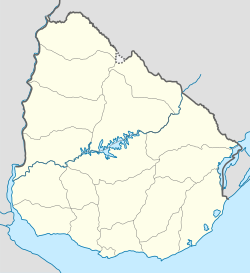Ciudad del Plata
Ciudad del Plata | |
|---|---|
City | |
| Coordinates: 34°46′0″S 56°22′50″W / 34.76667°S 56.38056°W | |
| Country | |
| Department | |
| Population (2011 Census) | |
• Total | 31,145 |
| Time zone | UTC -3 |
| Postal code | 80500 |
| Dial plan | +598 2 (+7 digits) |
| Website | www.ciudaddelplata.org |
Ciudad del Plata is a city in San José Department of Uruguay.
Geography
[edit]The city is bounded by the Santa Lucía River to the east and north and by the Río de la Plata to the south. Spanning the 23rd to the 39th km of Route 1 (also known as the "Brigadier General Manuel Oribe Highway"), Ciudad del Plata forms part of the conurbation of the capital Montevideo. Ciudad del Plata has an industrial core. The city is also known for the Jardines de Mater Terra, a private cemetery established in 1993.
History
[edit]The whereabouts of Ciudad del Plata were formerly known as Rincón de la Bolsa. It was a group of independent fragments, which became integrated into one populated centre, as a result of the westward expansion of the metropolitan area of Montevideo.[citation needed]
According to the legislative decree Nº 18.052, "the area enclosed by the River Santa Lucia, the Rio de la Plata and kilometre 35 of National Route 1" received city status under the name "Ciudad del Plata" on 25 October 2006, "integrating the areas Delta del Tigre y Villas, Playa Pascual, Parque Postel, Monte Grande and Santa Monica".[1]
Population
[edit]In 2006, an official estimate of its population was approximately 26,000 inhabitants.[2] According to the 2011 census, Ciudad de la Plata has a population of 31,145[3]
| Year | Population |
|---|---|
| 1963 | 3,854 |
| 1975 | 11,124 |
| 1985 | 13,512 |
| 1996 | 20,712 |
| 2004 | 26,582 |
| 2011 | 31,145 |
Source: Instituto Nacional de Estadística de Uruguay[4]
Barrios
[edit]The names of the various barrios (neighbourhoods) composing Ciudad del Plata are: Delta del Tigre, Sofima, Villa Rives, San Fernando, Autódromo Nacional, San Fernando Chico, Parque del Plata, Monte Grande, Safici (Parque Postel), Las Violetas, Penino, Santa Mónica, Santa María, Santa Victoria, San Luis, Playa Pascual, Villa Olímpica.
The populations of the five censual districts up to the 2011 census[5][6] were as follows:
| Delta del Tigre y Villas | Playa Pascual | Santa Mónica | Monte Grande | Safici | ||||||||||||||||||||||||||||||||||||||||||||||||||||||||||||||||||||||
|---|---|---|---|---|---|---|---|---|---|---|---|---|---|---|---|---|---|---|---|---|---|---|---|---|---|---|---|---|---|---|---|---|---|---|---|---|---|---|---|---|---|---|---|---|---|---|---|---|---|---|---|---|---|---|---|---|---|---|---|---|---|---|---|---|---|---|---|---|---|---|---|---|---|---|
|
|
|
|
|
Source: Instituto Nacional de Estadística de Uruguay[7][8][9][10]
Places of worship
[edit]- St. Joseph the Worker Parish Church (Roman Catholic)
- Delta del Tigre Parish Church (Roman Catholic)
- Iglesia de Jesucristo de los Santos de los Últimos Días
References
[edit]- ^ "LEY N° 18.052". República Oriental del Uruguay, Poder Legislativo. 1963. Archived from the original on 2013-12-29. Retrieved 28 June 2011.
- ^ Population according to official site Archived 2012-08-01 at the Wayback Machine
- ^ "Censos 2011 San José (needs flash plugin)". INE. 2012. Retrieved 25 August 2012.
- ^ "Statistics of urban localities (1963–2004)" (PDF). INE. 2012. Retrieved 5 September 2012.[dead link]
- ^ "2004 Census of San José department" (XLS). INE. 2004. Retrieved 28 June 2011.
- ^ "Censos 2011 Cuadros San José". INE. 2012. Archived from the original on 2013-03-09. Retrieved 25 August 2012.
- ^ "1963–1996 Statistics / D" (DOC). Instituto Nacional de Estadística de Uruguay. 2004. Retrieved 27 June 2011.
- ^ "1963–1996 Statistics / P" (DOC). Instituto Nacional de Estadística de Uruguay. 2004. Retrieved 27 June 2011.
- ^ "1963–1996 Statistics / M" (DOC). Instituto Nacional de Estadística de Uruguay. 2004. Retrieved 27 June 2011.
- ^ "1963–1996 Statistics / S" (DOC). Instituto Nacional de Estadística de Uruguay. 2004. Retrieved 27 June 2011.


